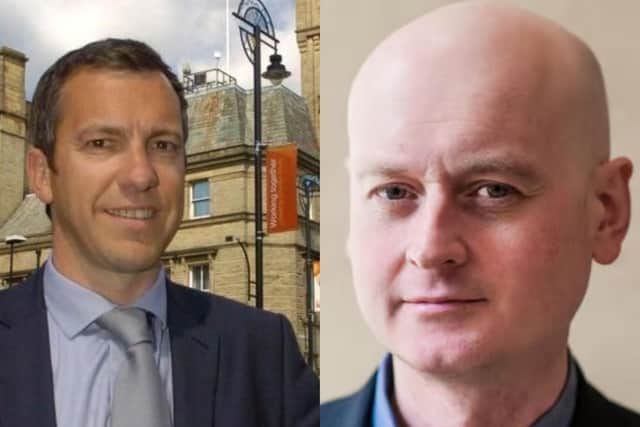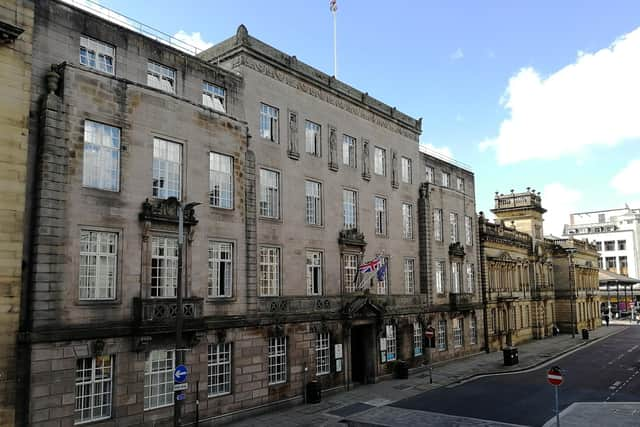Autumn statement: Preston and Chorley leaders call for council tax and funding rethink after the government grants permission for bigger bills
and live on Freeview channel 276
That was the claim from Chorley Council leader Alistair Bradley following the announcement in the chancellor’s autumn statement that councils will be given the “flexibility” to increase bills by up to three percent before approval has to be sought from residents in a referendum. Currently, the threshold for a public vote on council tax hikes is set at two percent.
Neighbouring Preston City Council leader Matthew Brown said that the entire system of local revenue-raising needed a radical rethink to make it fairer and ensure that local authorities can continue to provide the services on which people rely.
Advertisement
Hide AdAdvertisement
Hide AdThe two Labour politicians were speaking after Jeremy Hunt’s long-awaited financial plans were laid out in the Commons.


A document published alongside the chancellor’s speech said that the council tax changes – which will also permit top-tier authorities like Lancashire County Council, which have responsibility for social care, to add a further two percent to their share of bills – would enable councils to set rates “based on the needs, resources and priorities” of local areas.
However, Cllr Bradley said that it appeared to be a method of “sharing out the unpopularity” of higher bills when there was a far simpler solution.
“What they should do, in my view, is properly fund local government. If they enabled [councils] a lot better than they actually do, then you might find local government is actually a bit cheaper and more efficient altogether.


Advertisement
Hide AdAdvertisement
Hide Ad“In Chorley, we very rarely put our council tax up by the max, because we don’t like asking residents for more money – we want the council to earn its money and do other things to raise revenues. But we’re fortunate, there are other councils not in that position.
“Give us some proper money to do proper things – and we’ll do it better than how it’s currently done,” Cllr Bradley appealed to the government.
Chorley did raise council tax by what was then the maximum-permitted 1.99 percent at its budget back in February – having frozen it for six out of the previous nine years – as a result of a forecast £1.1m deficit by 2024/25. That figure also assumed increases at the same level over the next two years, but it will not be known until next year’s budget is set whether the authority will make use of the additional council tax-raising powers it and other Lancashire district authorities will now have.
Meanwhile, Preston City Council’s mid-year budget review, published last month, revealed that the authority was facing a provisional savings target of £1m next year and £1.5m in 2024/25.
Advertisement
Hide AdAdvertisement
Hide AdCllr Brown told the Local Democracy Reporting Service after the autumn statement that cuts may be needed to balance the books next year, but that the authority’s members and officers were doing all they could to ensure that that outcome was averted.
However, on the broader issue of council tax – which the city council raised by 1.99 percent for the current year – Preston’s leader said that council funding needed to be fairer for residents and more empowering for local authorities themselves.
“The current arrangements are very unfair, because they disproportionately affect less well-off people. [Council tax] is regressive, because if there’s a home that’s valued at, say, £75,000 within Preston and then there’s one that’s valued at £7.5m, the more expensive [household] only pays about three or four times more.
“If someone’s living in a mansion, they should be paying a lot more council tax than they are now in Preston – or wherever – than someone who’s living in a terrace house.
Advertisement
Hide AdAdvertisement
Hide Ad“The council tax was introduced [in 1993] and society has moved on a lot since then. We’ve got to make sure those who are better off pay a little more locally and those who are not so well off pay a little less, in my view.
“There have been conversations about land valuation taxes and other [options] which seem much fairer and are based around land ownership and not just home valuations,” Cllr Brown said.
He added that he was proud of what Preston had achieved during what he described as “12 years of austerity” – but said that it was frustrating to always be trying to swim against the tide.
In the current climate, Cllr Brown said, sufficient funding was more important than ever, because of the realms in which councils were now having to operate.“We’re doing a lot of work around cost of living and anti-poverty [measures]. You can’t do that with an ever-decreasing pool of resources, it’s just not possible.
Advertisement
Hide AdAdvertisement
Hide Ad“People aren’t daft – they know you need money to do things.”
Delivering his autumn statement in the Commons, Jeremy Hunt said that the government was being “fair in our solutions” to the financial challenge the country was facing.
" Yes, we take difficult decisions to tackle inflation and keep mortgage rates down, but our plan also leads to a shallower downturn, lower energy bills, higher growth, and a stronger NHS and education system.”
The chancellor also told MPs that he would protect increases in departmental budgets over the next two years, which had already been agreed, and then grow spending at “one percent a year in real terms” across the following three. That, he acknowledged, meant that departments would have to “make efficiencies to deal with inflationary pressures”.
Advertisement
Hide AdAdvertisement
Hide AdResponding for Labour, shadow chancellor Rachel Reaves said that after three Prime Ministers, four chancellors and four budgets in 2022, the country was “in a worse place than we started the year, with inflation spiralling, growth plunging and living standards falling”.
She added: “It has been clear for weeks what the government want to do. Step one: blame global factors. Step two: pretend the mini-Budget has nothing to do with any of them. Step three: portray the chancellor and the Prime Minister as the people who can clear up the mess of their party’s own making.”
